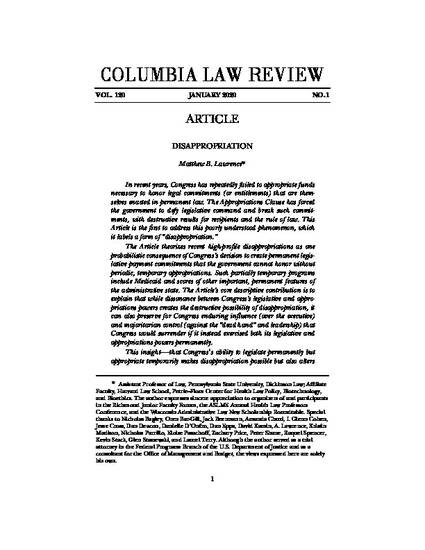
Article
Disappropriation
Columbia Law Review
(2020)
Abstract
In recent years Congress has repeatedly failed to appropriate funds necessary to honor legal commitments (aka entitlements) that are themselves enacted in permanent law. The Appropriations Clause has forced the government to defy legislative command and break such commitments, with destructive results for recipients and the rule of law. This Article is the first to address this poorly-understood phenomenon, which it labels a form of “disappropriation.”
The Article theorizes recent high-profile disappropriations as one probabilistic consequence of Congress’s decision to create permanent legislative payment commitments that the government cannot honor without periodic, temporary appropriations. Such partially-temporary programs include Medicaid and scores of other important, permanent federal payment commitments. The Article’s core descriptive contribution is to explain that while dissonance between Congress’s legislative and appropriations powers creates the destructive possibility of disappropriation, it can also preserve for Congress enduring influence (over the executive) and majoritarian control (against the “dead hand” and leadership) that Congress would surrender if it instead exercised both its legislative and appropriations powers permanently.
This insight — that Congress’s ability to legislate permanently but appropriate temporarily makes disappropriation possible but also alters the balance of powers — has theoretical implications for constitutional doctrine, the separation of powers, the design of new legislative commitments, and efforts to reduce the harms of disappropriation. The Article’s normative component addresses the regulation and adjudication of disappropriation in light of these implications. It conceptualizes shutdowns as aggregations of distinctive disappropriations (a “they” not an “it”) and cautions that prior scholarly analyses of proposals to prevent shutdowns by financially penalizing legislators for failing to appropriate funds necessary to honor pre-existing commitments are incomplete because they fail to consider upstream impacts on the balance of powers. And it explains that courts could play a salutary role without interfering with the balance of powers by favoring rules that promote durability but not entrenchment, i.e., by adopting rules that tend to reduce the ex ante likelihood of disappropriation without undermining the credibility of the threat of disappropriation. In practice this weighs in favor of judicial approaches that prevent inadvertent disappropriation by reducing uncertainty and private information. Courts should therefore adopt an interpretive presumption against disappropriation, empower civil servants to enforce disappropriation ex ante rather than empower Congress to do so ex post (as the House of Representatives sought to do in House v. Burwell), and endeavor in adjudicating actions seeking damages in the aftermath of disappropriation to reduce ex ante uncertainty and avoid interference with the political branches.
Keywords
- Appropriations,
- health law,
- Separation of powers,
- administrative law,
- Entitlements
Disciplines
Publication Date
Winter January, 2020
Citation Information
Matthew Lawrence. "Disappropriation" Columbia Law Review (2020) Available at: http://works.bepress.com/matthew-lawrence/9/
